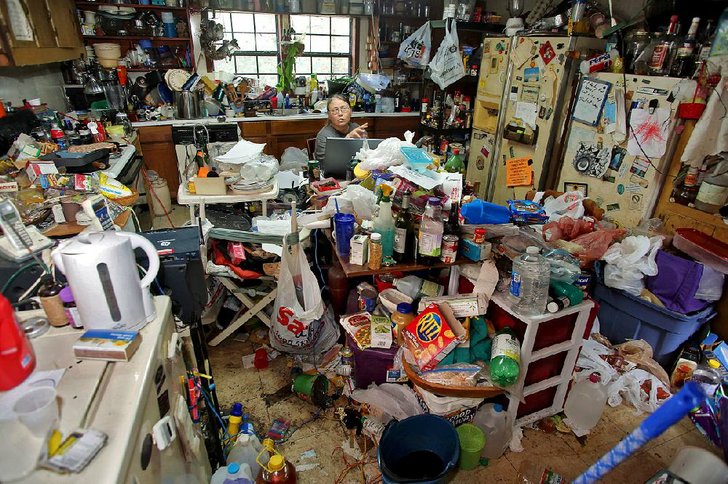|
A philatelist collects stamps, a numismatist collects coins of different countries and some individuals love to collect vintage cars or clocks. Some other individuals are quite different-though they don’t collect stuff, they find it difficult to throw away unwanted things like magazines, newspapers, old clothes and much more scared that they might need these some day in their life. The things keep piling up such that it becomes difficult to even sit down, move around or eat together inside their house. This is typical of a person who suffers from hoarding, a mental disorder.
Hoarding Vs Collecting Collecting things is different from hoarding in that the collection is well-ordered and easy accessible, whereas a hoard is extremely disorganized, takes up most of the space in the house and often lost as a needle in a haystack. The examples given at the start of this article are of collecting while the last one is typical of hoarding. Hoarding becomes a disorder when:
Individuals with hoarding disorder are a challenge to treat because they never see hoarding as a problem nor do they realize that it can impact/wreck the lives of their family members. The rare few who realize this problem are hesitant to seek help as they are ashamed of themselves. If we know someone who is addicted to hoarding, it is better that we gently ask him/her to get it consulted as this problem can cause health and safety issues beyond loneliness. We have to realize that people with this disorder don’t have the decision-making ability anymore and when someone steers them towards the right solution, it makes life simpler for them. What Stimulates Such Freaky Activity? If you look at the larger picture, there is still no valid cause behind such actions taken and no diagnosis available to track this disorder. Starting during adolescence or teen years, the disorder might aggravate over the decades. Hoarding disorder might also be symptoms of another problem- dementia, mobility problems, mental depression, obsessive compulsive disorder (OCD) or psychotic disorder (schizophrenia). Read more on mental disorders at www.firsteatright.com. The main reason why people hoard is that they believe that these things might come in handy sometime later in life. They might feel that it has sentimental value, too good a bargain to ignore or irreplaceable. The common reasons behind the big ‘why’ include:
Some people hoard a multitude of items while some others might hoard a certain few things only. Commonly hoarded items include newspapers, books, clothes, letter, leaflets, bills, receipts, household supplies and containers. Hoarding ample data in mails is the recent addition to the list. Some people are so reluctant or scared to delete mails thinking that they will be needing it in the future and hence, never delete their mailbox items. Treatment There is no effective treatment available for hoarding disorder and till now, cognitive behavioral therapy is the only evidence-based treatment available for this problem. Through these talk sessions, although the therapist might not be 100% successful in motivating the person to throw away all the clutter, the affected individual might become aware of the problem at hand. Only if the biological cause behind this problem is uncovered, can effective solutions be provided. Comments are closed.
|
AVOID FRAUD. EAT SMART.+91 7846 800 800
AuthorDietitian & Nutritionist Dr. Nafeesa Imteyaz. Archives
July 2024
Categories
All
Dr. Nafeesa's Blog @blogspot |
- Home
- Written Testimonials
- Consult
- Clinics
- Blogs
-
Diet & Nutrition
- Diabetes Reversal
- IVF IUI not needed for PCOS PCOD Infertility
-
Medical Nutrition
>
-
Disease & Conditions
>
- Infertility | PCOS
- Diabetes Mellitus
- Cholesterol
- Hypothyroid
- Kidney Problems
- Hypertension
- Cardiovascular Diseases
- Liver Diseases
- Gastro intestinal disorder
- Cancer
- Metabolic Disorders
- Orthopedic Disorders
- Eating Disorders
- Dietary Recall
- Weight Record Filled By Clients
- Online Payment Transaction Details
- Online Clients Weight Check Form
- Our Program Package Service Charges
- Weight Record 2017 Clients
- Measurements sent by Clients
- Terms & Conditions Of Payment
- Thanks. Your Form is Submitted
- Video Testimonials
- Lifestyle & Wellness
- Lifestyle & Wellness Blog
- Allergy & Intolerance
- Weight Loss / Gain
- Weight Loss / Slimming Blog
-
Disease & Conditions
>
- Life Cycle Nutrition >
- Sports Nutrition >
- Integrity in Nutrition
- Knowledge Centre
© COPYRIGHT 2022. ALL RIGHTS RESERVED. FRST HEALTHCARE PVT LTD.
Dr. Nafeesa Imteyaz of First Eat Right clinic, is the Best Dietitian Nutritionist in Bangalore. Best Dietitian Nutritionist in Pune. Best Dietitian Nutritionist in Hyderabad. Best Dietitian Nutritionist in Chennai. Best Dietitian Nutritionist in Mumbai. Best Dietitian Nutritionist in Delhi. Best Dietitian Nutritionist in Kolkata.


